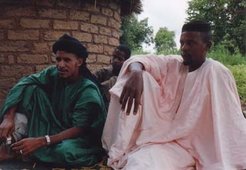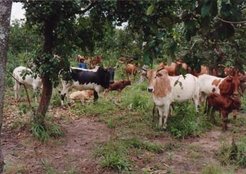Les Fulbe des espaces interstitiels: pastoralisme, migration et identités (Burkina Faso-Côte d ’Ivoire)
Les Fulbe des espaces interstitiels: pastoralisme, migration et identités (Burkina Faso-Côte d ’Ivoire)

A comparative analysis, combining oral traditions and written sources, seems to be helpful in understanding these processes. A limited comparison is likely to enable us to draw up a tentative typology of political integration and exclusion of the Fulbe pastoralists. We are thus looking into the position of early pastoral nomads in ancient sedentary states and administrative systems - e.g. the Bambara and Mossi kingdoms in Mali and Burkina Faso respectively - in order to compare it with their current position in postcolonial states. The Fulbe pastoralists are considered as irrational or wandering producers that governments and development planners try to control if not to settle. The case of modern Côte d'Ivoire, where the state implemented an attractive pastoral policy and encouraged the Fulbe to involve in the market economy, is an example of such tentative politics of control and integration of pastoral nomads in postcolonial states. Moving into new contexts leads to new arrangements with local groups. Independently of the state intervention, the Fulbe pastoralists always negotiate with customary landowners in order to stay in villages and exploit natural resources. Access to land is, among other socio-cultural institutions, one of the means by which they are integrated into villages communities. Various forms of cooperation and institutional arrangements binding together pastoralists and peasants have been noted.

Conflict represents another facet of pastoralist-peasant relations. Crop damage and natural resource competition are the main reasons for conflict between the two groups. As a result, right to residence, grazing right or right over water may become fragile and even contested. The pastoralists may ultimately be evicted from their residence in a hard conflict situation. In northern Côte d'Ivoire, we have noted that right to residence tends to laps where Fulbe cattle repeatedly make crop damage. In the area of study, there are also evidence suggesting that the state control over land is more nominal than real. Vacant land does not exist in the "traditional" conception. Indigenous peasants usually encroach on land delineated by the state as forest zone or seen as empty space to be allocated to pastoral groups. In the Ivorian case, the state intervention for controlling and delineating pastoral zones in order to promote cattle husbandry and reduce at the same time peasant-pastoralist conflicts have had a limited impact on the relations between the two groups.
Finally, as observed in Côte d'Ivoire, the pastoral mobility may have political consequences. This is not peculiar to that country, but there interest groups of peasants are stronger than that of Fulbe pastoralists regarded as "strangers". Although they have the support of the government - because they are supposed to hold a crucial role in the national economy - the presence of the Fulbe in Côte d'Ivoire has become a matter of political debate. There are indications showing that the politicisation of peasant-pastoralist conflicts is closely connected with the intervention of a range of interest groups trying to take political and economic advantages of pastoralist-peasant interactions. Among these are local politicians, administrative officials, traditional hunters and civil servants. This study of pastoralism, migration and identity, in its final shape, would perhaps help to advance the anthropological and historical understanding of the West African Fulbe.

